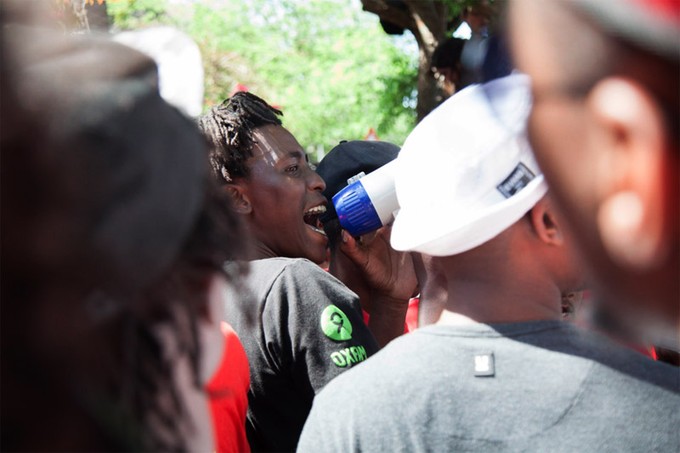
Masixole Mlandu, who is standing for UCT’s SRC, is not allowed on campus following a court order. Photo: Ashraf Hendricks
7 September 2016
Elections for the Student Representative Council at the University of Cape Town (UCT) have been suspended because one of the students on the list is interdicted from being on campus. As a result, the Election Commission says it “cannot fulfil its mandate to conduct free and fair elections”.
The SRC candidate is Masixole Mlandu who is running as a PASMA (Pan Africanist Student Movement of Azania) candidate. Mlandu was interdicted from entering campus in a court order that was made final on 11 May this year. The order followed the 16 February Shackville protest on campus, during which artwork and vehicles were set alight.
The Election Commission said in a statement on 6 September that the decision had been made “as a matter of principle”.
According to the SRC Election Regulations, the Commission is “an independent and impartial body” that consists of five staff members and five students, nominated by various committees and councils.
On 26 August, the eligibility of all the candidates was validated and the following week the Election Commission asked UCT management to allow Mlandu access to the campus for the duration of the SRC elections.
“It was communicated that no such exception could be secured,” said the Election Commission in a statement.
The court order allows the interdicted students to have access to campus with the written consent of the university’s vice-chancellor. But in a statement today Elijah Moholola, head of UCT media liaison, said UCT had sought legal opinion and “it is clear that the interdict prohibits the student from being on campus to campaign”.
“In terms of this specific Court Order, the Vice-Chancellor does not have the authority to grant permission for exceptions.”
“The student is therefore in a position where he is free to stand for election but may not be on campus,” said Moholola. He said the university was looking for a solution to the matter.
The commission said it could not conduct free and fair elections as it could not “provide all candidates with equal campaigning opportunities; provide voters with free and equal access to all candidates”. Campaign activities could not be moved off campus as the commission did not have the capacity “to ensure the safety of students present at these events”, the statement said.
Black Solidarity Action has questioned the reason for the suspension of the elections.
“As #BlackSolidarityAction we view this as the consolidation of white power because never in the recent history of UCT have we seen such an unprecedented number of candidates emanating from the Pan Africanist and Black Consciousness bloc,” they say in a statement.
Several candidates on the list have been prominent in the student protests over the past two years.
Black Solidarity Action said the suspension of the elections “must be viewed as an assault on the struggle for free decolonial education” because if there were no elections the “current useless SRC will continue with their project of protecting the Bremner mafia [referring to the senior staff at UCT whose offices are in the Bremner building]”.
In a statement, UCT PASMA expressed “full support” for the decision of the Election Commission.